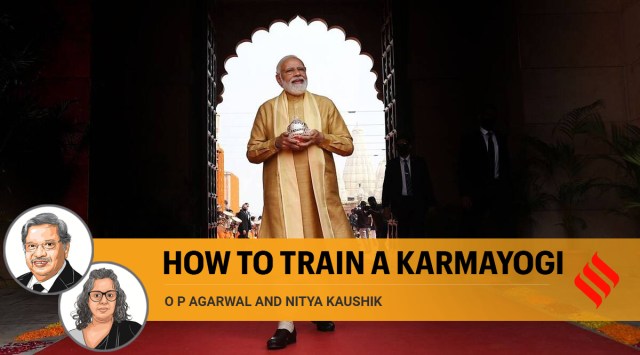- India
- International
OP Agarwal, Nitya Kaushik write: Training Karmayogis at all levels is a must for inclusive development
OP Agarwal, Nitya Kaushik write: Given our growth ambition, a massive scale-up in capacity-building is needed both at the political and bureaucratic levels
 Prime Minister Narendra Modi championed capacity building in 2004 when, as the chief minister of Gujarat, he launched the “chintan shivir” to discuss policies with his ministers and bureaucrats. (File)
Prime Minister Narendra Modi championed capacity building in 2004 when, as the chief minister of Gujarat, he launched the “chintan shivir” to discuss policies with his ministers and bureaucrats. (File)Recently, the Government of India’s Mission Karmayogi programme to build civil service capacity received a $47 million boost from the World Bank.Prime Minister Narendra Modi championed capacity building in 2004 when, as the chief minister of Gujarat, he launched the “chintan shivir” to discuss policies with his ministers and bureaucrats. Today, his government must build capacity of a far more complex nature.
Before 1985, capacity building of the higher civil services primarily involved two-year induction training. For the lower civil services there were no trainings. In 1985, the then government recognised that a two-year induction training was insufficient for senior officers. IAS officers were mandated to attend a week-long training annually, and periodic four-week trainings to allow reflection and learnings.
In the early 2000s, the government launched a year-long professional programme in public policy at IIM-Bangalore followed by programmes in IIM Ahmedabad, MDI Gurgaon and TERI University. The government further strengthened the mid-career training for IAS officers by introducing Phases III, IV and V programmes at three different points of their career, in addition to Phases I and II (induction training). The rationale was that while the induction programmes equipped IAS officers to be good field officers, they needed different competencies at more senior levels.
Today, given our growth ambition, a massive scale-up in capacity-building is needed both at the political and bureaucratic levels. As democracies mature, elected representatives will play a more proactive role in policy making. It is, therefore, imperative that representatives are able to understand the nuances of policy making.
Such a programme must build capability to envision the future and work towards realising it. It must equip the entire chain of command to coordinate and steer the ship towards a national goal. A forward-looking mindset that can quickly seize opportunities and foresee threats is critical.

🚨 Limited Time Offer | Express Premium with ad-lite for just Rs 2/ day 👉🏽 Click here to subscribe 🚨
Capacity building must aim at building professionals in all domains, from technical experts to generalists. As policymaking gets more complex, respect for data and evidence-based decision making will gain importance. We won’t be able to afford top-level officials with little experience in the subject of their departments. Political leaders too would need to choose areas of specialisation.
Finally, building morale and self-respect among the frontline workers is critical. They include people like police constables, patwaris, gram sevaks, frontline clerks, office peons, postmen, etc. They must recognise that they are important members of the larger public management system, not mere cogs in the wheel.
Way back in 2004, while serving as Joint Secretary (Training) in the Union Department of Personnel and Training, one of us witnessed a three-day programme organised for safai karamcharis of the Satara Municipal Corporation. In scenic Panchgani, nearly 600 sanitation workers participated in the workshop, which included complimentary health checks, interactive problem-solving exercises, and other customised edutainment programmes. The participants left the session feeling respected, with a promise to put their newly acquired learnings to use. A month later, when our team visited Satara, they found that the workers had proactively set up a waste segregation system by educating each household within their ward. When asked if they were concerned that a drop in garbage collection would render them jobless, a woman employee replied: “Our job is not to clean the city, but to keep the city clean”. This change in attitudes is the power of training.
The good news is that India already has everything it needs to scale up capacity building. The existing institutions and educational centres, as well as the available expertise and knowledge base, can appropriately support trainings for various grades of civil servants. However, at the heart of such a massive capacity-building exercise is logistics — if existing institutions are used to their full capacity, there won’t be a need to invest in more brick-and-mortar establishments. Investments in high-quality learning material and using a pedagogy that is appropriate to the group, rather than standard classroom lectures, will be a better use of funds.
This column first appeared in the print edition on June 24, 2022 under the title ‘How to train a Karmayogi’. Agarwal is CEO, World Resources Institute India. Kaushik is head, Communications, WRI India. Views are personal
EXPRESS OPINION
More Explained
Apr 26: Latest News
- 01
- 02
- 03
- 04
- 05











































